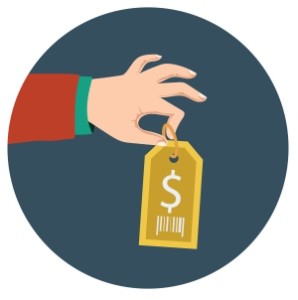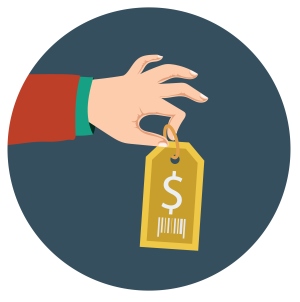“Oh, that’s expensive.”
I used to hate hearing this. Everything would be going great with a potential client. I would explain how I can help them, and they would nod their head enthusiastically. Then I would tell them the price and everything would grind to a screeching halt. “Oh, that’s expensive,” they’d say, shaking their head.

Panic would hit me. How can I win the business? Do I need to lower my price?
It’s taken me years and some painful experiences to learn how to best handle price objections.
Today, I’ll share four ways to deal with price concerns, so you can land more clients without lowering your prices.
1. Steer clear of “Google dialers”
With many prospects, the issue of price will come up after you’ve had a chance to explore their situation. But some prospects insist on making it the first order of business. I call these people “Google dialers,” because they are likely calling everyone who came up in their Google search, hunting for the cheapest price. Unless being cheapest is your business strategy, steer clear! In the past, I spent too much time trying to explain my value to Google dialers, but it was almost always fruitless. Someone who leads with price is ultimately focused on price. They won’t value your expertise and hard work.
Recently I was a Google dialer myself. I needed sandwiches for an event, and I really didn’t care much about anything but the price. So I started calling caterers asking, “How much?” I hope any caterer who took pride in their food and service quality didn’t feel pressured to give me a low price. I simply wasn’t willing to pay for their expertise, so entertaining a conversation with me would have been aggravating and ultimately fruitless. Their time would be better spent looking for customers who appreciate the level of quality they offer.
2. Move the conversation back to benefits
Learning to steer clear of Google dialers can save you time and headache, but things get more challenging when a prospect freaks out about prices after you have discussed their needs and presented a proposal.
Surprisingly, when a client says something is too expensive, having a conversation about price is often counterproductive. That’s because price is often not the real issue. What is happening is that the price is too high relative to the benefit they see from the purchase. If you offer me a piece of paper for $100, I’ll balk. But if you then explain that this paper is a first-class ticket to Paris, I’ll eagerly buy it.
So if you’re getting questioned on price, you have more work to do explaining the benefits of your service. Move the conversation back to the value your client can expect from working with you. Tell success stories. Help them see how happy they will be with the results. (Dive deep on how to explain your value in this article I wrote.)
For example, one of my clients sells advertising on her popular New York City blog. When potential advertisers say her rates seem high, she says, “Well, they’re very reasonable considering how much new business you can generate.” She offers case studies about the big jumps in website traffic her advertisers are getting, and about the many new calls they receive from potential customers. Hearing this, prospects come to see her ad rates as a worthwhile investment.
3. Never reduce price without reducing scope
One of my clients, a marketing consultant, asked my advice on how to close a potential client. “They said my proposal was too expensive, so I gave them a discount,” he explained. “But now they are saying it’s still too much and need me to go even lower. I already went as low as possible! I’m barely making money as it is. What do I do?”
Sometimes we do need to accommodate a client’s budget constraints. But in this case, the consultant sabotaged the situation when he first offered the discount. You see, by reducing the price when pushed, you are telling your potential client, “There is gravy in my prices. I am making extra money off of you, but if you push you can get it out of me.” Since you have trained your prospect that pushing works, they will keep doing it, assuming there is more gravy in your prices.
If you must reduce your price to fit within a client’s budget, always reduce the scope of the project at the same time. This way you are signaling that your prices are fair (no gravy), and that you want to make it work with the client’s budget. For example, a website developer I worked with offers a standard website for $10,000. If a client can only afford to spend $8,000, the developer removes some of the features in order to hit this price. Clients respect the choice you are offering reduced features for $8,000 or more features for $10,000.
4. Be okay with walking away
The owner of a construction company recently told me that he is nine months into an 18-month project, and it has become clear he is going to lose money on the project. He ended up in this situation because he quoted a really low price in order to secure the business. Because he hadn’t made prior arrangements to deal with overruns, he had no choice but to eat the costs. It was going to be an expensive lesson in underpricing.
If you feel desperate for the sale, you will likely act desperate, despite your better judgment. It’s best to be okay walking away. The really amazing thing about this is that if you follow my advice, and consistently command higher prices for your work, you can actually work less and make the same amount of money. For example, five projects at $10,000 each is more lucrative–and likely less time consuming–than seven projects at $7,000 each. Keep this in mind next time you smile and say, “Sorry, the price is fixed.”
Share your thoughts
What have you found successful for handling price-obsessed clients? How have you closed sales without compromising on your pricing? Share your successes with us by posting a comment below.
I originally wrote this post for the Freshbooks blog.
